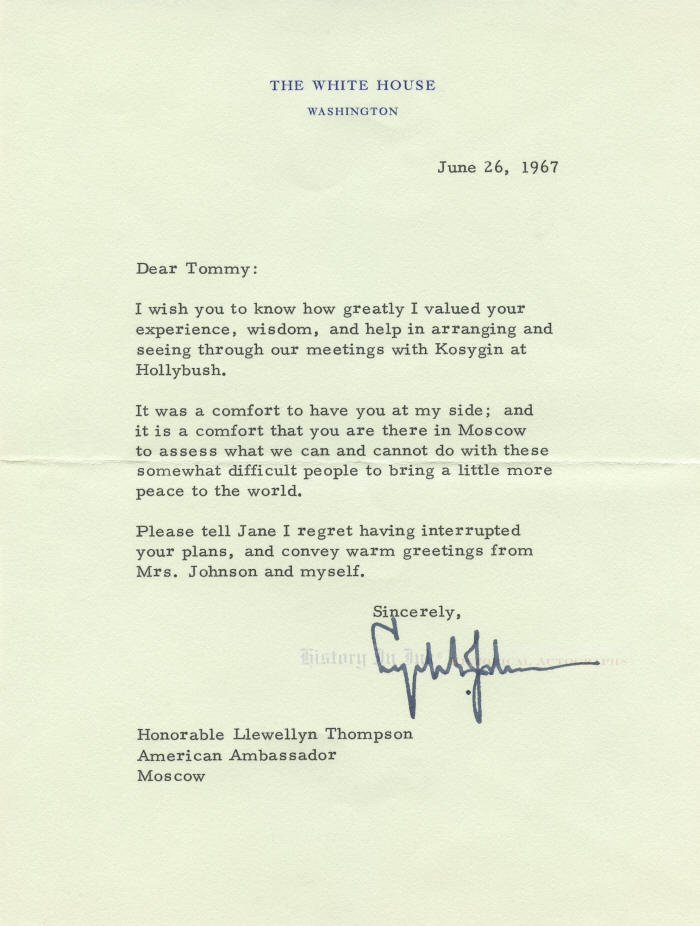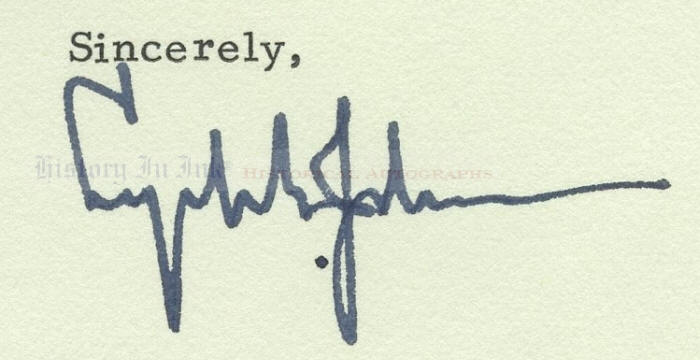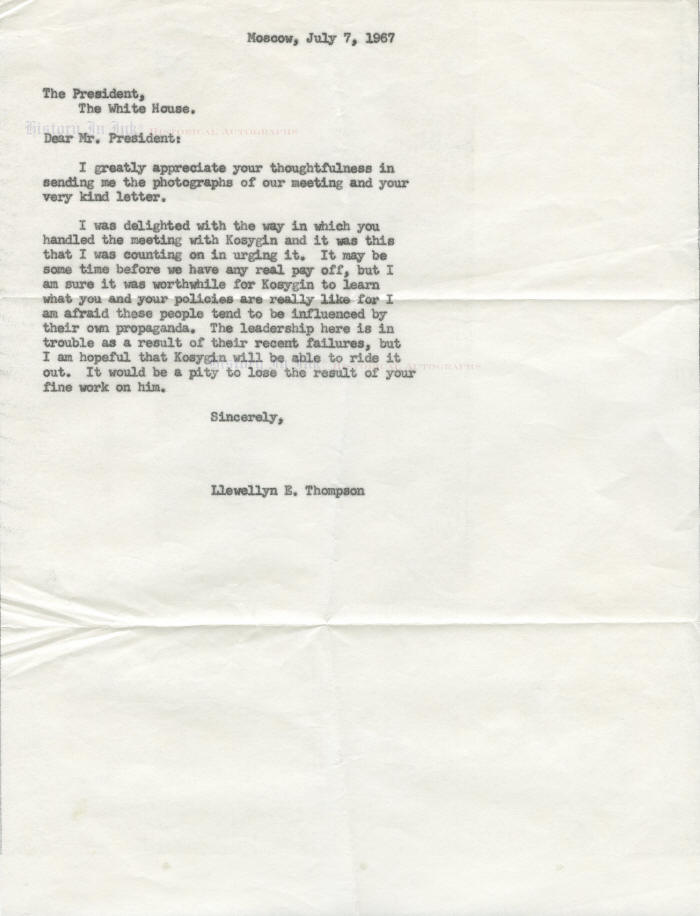


1403311
Lyndon B. Johnson
Scroll down to see images of the item below the description
From the Estate of Llewellyn E. Thompson,
United States Ambassador to the Soviet Union
” . . . it is a comfort that you are there in Moscow to assess
what we can and cannot do with these somewhat difficult people
to bring a little more peace to the world.”
Lyndon Baines Johnson, 1908–1973. 36th President of the United States, 1963–1969. Typed Letter Signed, Lyndon B. Johnson, one page, 6¾" x 8¾", on stationery of The White House, Washington, [D.C.], June 26, 1967. With original envelope and carbon copy of reply.
The Six Day War between Israel and Syria, Jordan, and Egypt in June 1967, with the resulting tension between the United States and the Soviet Union, provides the backdrop for this archive.
Believing that the Arab countries were poised to join forces against it, Israel attacked Egyptʼs troops in the Sinai Peninsula and virtually destroyed the air forces of all three countries in a massive coordinated operation on June 5. By June 9, Israeli troops had reached the Suez Canal and surrounded Egyptian forces on Sinai and had captured East Jerusalem, the west bank of the Jordan River and the Golan Heights.
The U.S. State Departmentʼs declaration of American neutrality—when President Johnson had no such policy—ignited a controversy that turned both Jews and Arabs against the Administration. A number of Arab countries severed diplomatic relations with the United States over Egyptian charges that the United States had provided air support for Israeli ground forces. Pro-Israel factions decried the neutrality statement as a reversal of the longstanding American commitment to Israel's existence. Johnson moved quickly to quell the controversy while seeking a way to stop the fighting. American and Israeli disagreement over acceptable cease-fire terms deepened, however, when Israeli planes and torpedo boats attacked the USS Liberty, an electronic spy ship flying the American flag, in broad daylight and clear weather as it sailed in international waters north of the Sinai Peninsula. The attack killed 34 Americans and wounded another 171. Privately, Johnson rejected Israel's explanation that it had mistaken the Liberty for an Egyptian ship. Although Johnson had backed away from his position that Israel pull back to its pre-war borders, opting instead for a “simple cease fire,” and despite Secretary of State Dean Rusk's warning of United Nations Security Council condemnation, Israel continued to fight.
The Soviet Union, an ally of the Arab states, entered the fray, warning that unless the United States influenced Israel to stop the war, it would take military action if necessary. In response, Johnson ordered the U.S. Sixth Fleet from Sicily to the eastern Mediterranean. But the unsettling Soviet action also caused him to send Israel a “clear signal" of American concern. Since Israel had conquered the Golan Heights, it agreed to a cease fire. The Soviets, however, sent armaments to the Arab countries, raising speculation about a possible Arab counter-offensive against Israel.
The opportunity for Johnson to meet with Soviet Premier Alexi Kosygin when the Soviet Union announced that Kosygin would appear before a special session of the U.N. General Assembly to seek a resolution demanding that Israel withdraw from the Arab territories. Johnson had not met with the Soviet leadership as President. Kosygin, concerned about a possible provocative deal between the United States and China over Vietnam, wanted to see Johnson. So the meeting was virtually a foregone conclusion. Ambassador Thompson supported it, although he downplayed expectations. He thought that a meeting could “start the process of moving toward an understanding with the Soviets,” although he did not think “that a meeting will result in any specific agreement on any specific question." Yet Soviet input on peace talks with North Vietnam could be beneficial, Thompson said, and “the effect of the President's personality on Kosygin" would give him something with which to “influence his colleagues in a better direction."
The place for the meeting, though, was a sticking point. Kosygin rejected Johnson's invitation to meet in Washington, D.C., out of concern that it would taint Soviet relationships with Middle Eastern countries and North Vietnam if he appeared to be a U.S. government guest. Johnson rejected Kosyginʼs suggestion that they meet in New York for fear that a meeting there would attract large numbers of anti-war protesters. Kosygin saw Johnson's counterproposal that they meet at Maguire Air Force Base in New Jersey as an attempt to intimidate the Soviets by meeting in a military setting. Ultimately, the leaders agreed to meet at Hollybush Mansion, the home of the president of Glassboro State College (now Rowan University) in Glassboro, New Jersey, just south of Philadelphia and about halfway between New York and Washington.
As Thompson predicted, the meeting, which lasted three days, June 23–25, resulted in no concrete agreements. Both Johnson and Kosygin expressed the desire for peace, but Kosygin later noted that “a great many difficulties and differences arose" with respect to how to solve specific problems. Although outwardly Kosygin was "friendly, jolly, and warm,” Kosygin could make no agreements without approval of the Politburo, and Johnson saw him as “an extremely disciplined Communist leader" who adhered to “existing Soviet positions hard" and refused to deal. On Vietnam, Johnson said, Kosygin's position “was rigid and familiar: we should stop the bombing and get out of Vietnam." The sides did make some progress on nuclear nonproliferation, though. Johnson proposed that he and Kosygin meet once a year, and Kosygin suggested that they stay in touch over the hotline that had been installed in the wake of the Cuban Missile Crisis.
Overall the meeting was seen as a positive one that improved relations between the two nations. Its generally friendly atmosphere was termed the “spirit of Glassboro."
It was with this background that Johnson wrote this letter to Thompson to thank him for his efforts. He writes, in full: “Dear Tommy: / I wish you to know how greatly I valued your experience, wisdom, and help in arranging and seeing through our meetings with Kosygin at Hollybush. / It was a comfort to have you at my side; and it is a comfort that you are there in Moscow to assess what we can and cannot do with these somewhat difficult people to bring a little more peace to the world. / Please tell Jane I regret having interrupted your plans, and convey warm greeting from Mrs. Johnson and myself.”
Johnson knew Thompson well and relied heavily on his views. Thompson (1904–1972) was a career American diplomat who had served as the United States Ambassador to the Soviet Union under Presidents Dwight D. Eisenhower and John F. Kennedy. He resigned in 1962 to accept Kennedyʼs appointment as Ambassador At Large and a special advisor on Soviet affairs. Along with then-Vice President Johnson, In 1967, Johnson appointed him to the Ambassador's post yet again, and he served until 1969.
Thompsonʼs file copy of his reply to Johnson accompanies this letter. Thompson wrote: “I greatly appreciate your thoughtfulness in sending me the photographs of our meeting and your very kind letter. / I was delighted with the way in which you handled the meeting with Kosygin and it was this that I was counting on in urging it. It may be some time before we have any real pay off, but I am sure it was worthwhile for Kosygin to learn what you and your policies are really like for I am afraid these people tend to be influenced by their own propaganda. The leadership here is in trouble as a result of their recent failures, but I am hopeful that Kosygin will be able to ride it out. It would be a pity to lose the result of your fine work on him."
Kosygin, however, did not last. From the beginning, after the ouster of Nikita Khrushchev, he shared power with Leonid Brezhnev. Kosygin was Premier, but Brezhnev was the General Secretary of the Central Committee of the Communist Party, a more visible position typically synonymous with that of the leader of the Soviet Union. Kosygin insisted that, as the head of state, he should handle foreign relations, and during the 1960s he did so, as his summit with Johnson evidences. Brezhnev was jealous of the popular Kosygin, however, and thwarted his attempt to implement economic reforms by shifting Soviet economic emphasis from heavy industry and military production to light industry and the production of consumer goods. Although Kosygin's early efforts at economic reform were successful, by 1969 the joint Kosygin-Brezhnev system was failing on various fronts, as Thompson noted in his letter to Johnson. By the early 1970s, Brezhnev had become the de facto leader by transferring some of Kosyginʼs powers to others and then consolidating them to himself. When Kosygin resigned after he became ill in 1980, he was stripped of all of his government perks. Members of the Politburo, his aides, and even security guards ignored him, and he died alone.
Johnsonʼs letter is in very fine condition, and the original envelope is extra fine. Johnson has signed with a bold 2⅛" black fountain pen signature. The letter has a single mailing fold that does not touch either the text or the signature. The envelope, which evidently was delivered by diplomatic pouch, has not been sealed and bears no postal markings. The original glue is present on the flap. The carbon copy of Thompson's letter to the President has horizontal and vertical folds and is in fine condition.
Provenance: These letters come directly from the Thompson estate. They have never been offered on the autograph market before.
Unframed.
_____________
This item has been sold, but
click here to see other
Presidents and First Ladies items
that we are offering.



